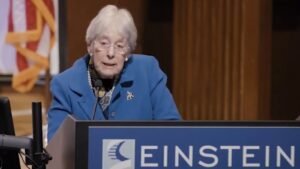
Dr. Ruth Gottesman’s historic $1 billion donation will provide free tuition at New York Medical School
A generous donation of $1 billion by a former faculty member will enable a medical school in the Bronx, the borough with the poorest health outcomes in New York, to cover tuition fees for every student. The Albert Einstein College of Medicine in New York City revealed on Monday that Dr. Ruth Gottesman, who became part of the faculty in 1968 and currently serves as the chair of the Einstein Board of Trustees, made the monumental contribution. “With this unprecedented donation – the biggest ever received by any medical school in the nation – every Einstein student will be exempt from paying tuition fees moving forward,” the institution declared.
The college is also refunding the tuition expenses for the most recent semester to all current students. Going forward, all new enrollees will benefit from tuition-free education.
The donation is being made from the wealth accumulated by her late husband, David “Sandy” Gottesman, a notable Wall Street financier and an early Berkshire Hathaway investor, who passed away in September 2022.
Dr. Gottesman expressed her gratitude towards her late husband, Sandy, for entrusting her with these funds, and she considers it a significant honor to donate to such a noble cause. Annually, over 100 students are admitted to the college, where tuition fees reach around $60,000 yearly, leading to many graduates facing over $200,000 in debt by the end of their studies.
The institution emphasized that this substantial donation aims to draw a diverse and skilled group of students who might not have the financial capacity to pursue medical studies otherwise. It is expected to nurture future healthcare leaders who can push the frontiers of research and patient care without the worry of overwhelming student loans.
Currently, the college has approximately 1,100 students and is situated in the Bronx, the New York State area that is ranked lowest for health metrics and outcomes, as per the University of Wisconsin Population Health Institute.




Leave A Comment